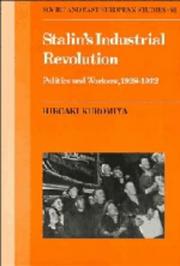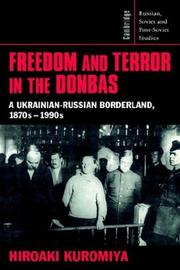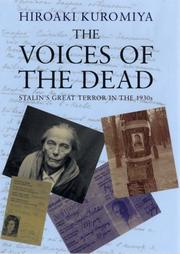| Listing 1 - 8 of 8 |
Sort by
|

ISBN: 052135157X Year: 1988 Publisher: Cambridge Cambridge University Press
Abstract | Keywords | Export | Availability | Bookmark
 Loading...
Loading...Choose an application
- Reference Manager
- EndNote
- RefWorks (Direct export to RefWorks)
History of North America --- History of Eastern Europe --- Stalin, Joseph --- anno 1930-1939 --- Central planning --- Working class --- Planification centrale --- Travailleurs --- History --- Histoire --- Stalin, Joseph, --- Soviet Union --- URSS --- Economic policy --- Industries --- Politics and government --- Politique économique --- Industrie --- Politique et gouvernement --- Industrialization --- Politique économique --- History.

ISBN: 9780521526081 9780521622387 0521622387 0521526086 0465002374 9780465018970 0465018971 9780465002375 Year: 1998 Publisher: Cambridge Cambridge University Press
Abstract | Keywords | Export | Availability | Bookmark
 Loading...
Loading...Choose an application
- Reference Manager
- EndNote
- RefWorks (Direct export to RefWorks)
"This is a book about the steppe frontier land on the border of Ukraine and Russia. A little-known former Cossack land, the Donbas remained a haven for fugitives, providing freedom to whoever needed it. As a result, Stalin's Terror was extraordinarily harsh in the Donbas. Drawing on much new information from formerly closed archives in Ukraine and Russia, the book paints a detailed yet panoramic picture of the tumultuous history of the Donbas and analyzes critical events in modern Ukrainian and Russian history from a regional perspective."
Political persecution --- Political repression --- Repression, Political --- Persecution --- Civil rights --- Donets Basin (Ukraine and Russia) --- Donbas (Ukraine and Russia) --- Donbass (Ukraine and Russia) --- Donets Basin (Ukraine and R.S.F.S.R.) --- History --- Princes --- Habsburg-Lothringen, Wilhelm, --- Habsburg, House of. --- Lothringen, Wilhelm Habsburg-, --- Vyshyvanyĭ, Vasylʹ, --- Vyshyvany, Vasyl, --- Habsburh, Vilʹhelʹm, --- Habsburh, V. --- Вишиваний, Василь, --- Vyshywany, Vasil, --- History of Eastern Europe --- anno 1800-1899 --- anno 1900-1999 --- Russia --- Ukraine --- Habsburh, Vilʹhelʹm fon, --- Габсбург, Вільгельм фон,
Book
ISBN: 1003203353 1000832201 1032066733 1032066768 Year: 2022 Publisher: Abingdon, Oxon ; New York, New York : Routledge,
Abstract | Keywords | Export | Availability | Bookmark
 Loading...
Loading...Choose an application
- Reference Manager
- EndNote
- RefWorks (Direct export to RefWorks)
"Stalin was a master of deception, disinformation, and camouflage, by means of which he gained supremacy over China and defeated imperialism on Chinese soil. This book examines Stalin's covert operations in his hunt for supremacy. By the late 1920s Britain had ceded place to Japan as Stalin's main enemy in Asia. By seducing Japan deeply into China, Stalin successfully turned Japan's aggression into a weapon of its own destruction. The book examines Stalin's covert operations from the murder of the Manchurian warlord Zhang Zuolin in 1928 and the publication of the forged "Tanaka Memorial" in 1929, to Stalin's hidden role in Japan's invasion of Manchuria in 1931, the outbreak of all-out war between China and Japan in 1937, and Japan's defeat in 1945. In the shadow of these and other events we find Stalin and his secret operatives, including many Chinese and Japanese collaborators, most notably Zhang Xueliang and Kōmoto Daisaku, the self-professed assassin of Zhang Zuolin. The book challenges accounts of the turbulent history of inter-war East Asia that have ignored or minimized Stalin's presence and instead exposes and analyzes Stalin's secret modus operandi, modernized as "hybrid war" in today's Russia. The book is essential for students and specialists of Stalin, China, the Soviet Union, Japan, and East Asia"--
Hybrid warfare. --- China --- Foreign relations --- War --- Stalin, Joseph, --- Zhang, Zuolin, --- Assassination. --- Chang, Tso-lin, --- Zhang, Yuting, --- Chang, Yü-tʻing, --- Zhangzuolin, --- Chzhan, T︠S︡zolinʹ, --- Chō, Sakurin, --- 张作霖, --- 張作霖, --- Djougatchvili, Iossif Vissarionovitch, --- Джугашвили, Иосиф Виссарионович, --- Dzhugashvili, Iosif Vissarionovich, --- Koba, --- Shih-tʻai-lin, --- Sidalin, --- Ssu-ta-lin, --- Stalin, Giuseppe, --- Сталин, И. В. --- Stalin, I. V. --- Сталин, Иосиф, --- Stalin, Iosif, --- Сталин, К., --- Stalin, K., --- Staline, --- Staline, Joseph, --- Staljin, J. V., --- Sutārin, --- Soselo, --- Stalini, Ioseb Besarionis że, --- Sṭalin, Y. Ṿ., --- Sṭalin, Y., --- Stalin, Josef, --- Stalin, Josef Vissarionovich, --- סטאלין, יאסיף, --- סטאלין, י. --- סטאלין, י. וו --- סטאלין, י. װ. --- סטאלין, י., --- סטלין, יוסיף ויסאריונוביץ׳, --- סטלין, יוסף --- 斯大林, --- Stalin, Jossif Vissarionovitš, --- Sztálin, Joszif, --- Istālīn, Yūsīf Vīsāryūnūvīch, --- استالين، يوسيف ويساريونووتج, --- Σταλιν, Ιωσηφ, --- Stalin, Ιōsēph, --- Jughashvili, Ioseb, --- Jughashvili, Ioseb Vissarionovich, --- Jughashvili, Koba,
Book
Year: 2023 Publisher: [Place of publication not identified] : Taylor & Francis,
Abstract | Keywords | Export | Availability | Bookmark
 Loading...
Loading...Choose an application
- Reference Manager
- EndNote
- RefWorks (Direct export to RefWorks)
"Stalin was a master of deception, disinformation, and camouflage, by means of which he gained supremacy over China and defeated imperialism on Chinese soil. This book examines Stalin's covert operations in his hunt for supremacy. By the late 1920s Britain had ceded place to Japan as Stalin's main enemy in Asia. By seducing Japan deeply into China, Stalin successfully turned Japan's aggression into a weapon of its own destruction. The book examines Stalin's covert operations from the murder of the Manchurian warlord Zhang Zuolin in 1928 and the publication of the forged "Tanaka Memorial" in 1929, to Stalin's hidden role in Japan's invasion of Manchuria in 1931, the outbreak of all-out war between China and Japan in 1937, and Japan's defeat in 1945. In the shadow of these and other events we find Stalin and his secret operatives, including many Chinese and Japanese collaborators, most notably Zhang Xueliang and Kōmoto Daisaku, the self-professed assassin of Zhang Zuolin. The book challenges accounts of the turbulent history of inter-war East Asia that have ignored or minimized Stalin's presence and instead exposes and analyzes Stalin's secret modus operandi, modernized as "hybrid war" in today's Russia. The book is essential for students and specialists of Stalin, China, the Soviet Union, Japan, and East Asia"
Book
ISBN: 3110469510 3110469596 Year: 2016 Publisher: Warsaw ; Berlin : De Gruyter Open,
Abstract | Keywords | Export | Availability | Bookmark
 Loading...
Loading...Choose an application
- Reference Manager
- EndNote
- RefWorks (Direct export to RefWorks)
Even the best books on international history are ignorant of the secret war against the Russian Empire and the Soviet Union waged jointly by the Caucasian peoples and Japan in the first half of the twentieth century. This book explores and exposes previously unknown passages in Eurasian international history. Although the secret war ultimately failed in liberating the Caucasian peoples, the lessons of this Eurasian collaboration were not lost on the United States, which after World War II confronted the Soviet Union just as Japan had earlier. Washington copied the strategy of its former enemy and developed it further. The Eurasian triangle of Russia, the Caucasus, and Japan is a forgotten history of cardinal importance that, stretching from the Russo-Japanese War to World War II, influenced Western Cold War strategies. This book is also the story of a friendship rare in international politics between two unlikely partners unspoiled by political vicissitudes.
Russo-Japanese War, 1904-1905. --- Eastern question (Far East) --- World War, 1914-1918 --- World War, 1939-1945 --- Campaigns --- Chinese question --- Far Eastern question --- Open door policy (Far East) --- Pan-Pacific relations --- Japanese-Russian War, 1904-1905 --- World War One, World War Two, Japan, Russia, the Caucasus, Georgia, the Russo-Japanese War. --- Russo-Japanese War (1904-1905) --- World War (1914-1918) --- World War (1939-1945) --- 1904-1945 --- Eastern Front (World War (1914-1918)) --- Japan. --- al-Yābān --- Giappone --- Government of Japan --- Iapōnia --- I͡Aponii͡ --- Japam --- Japani --- Japão --- Japon --- Japonia --- Japonsko --- Japonya --- Jih-pen --- Mư̄ang Yīpun --- Nihon --- Nihonkoku --- Nippon --- Nippon-koku --- Nipponkoku --- Prathēt Yīpun --- Riben --- State of Japan --- Yābān --- Yapan --- Yīpun --- Zhāpān

ISBN: 9780300123890 0300123892 Year: 2007 Publisher: New Haven ; London Yale University Press
Abstract | Keywords | Export | Availability | Bookmark
 Loading...
Loading...Choose an application
- Reference Manager
- EndNote
- RefWorks (Direct export to RefWorks)
Political persecution --- State-sponsored terrorism --- Victims of state-sponsored terrorism --- History. --- Soviet Union --- History --- State-sponsored terrorism.
Book
Year: 2016 Publisher: Berlin, Germany : De Gruyter,
Abstract | Keywords | Export | Availability | Bookmark
 Loading...
Loading...Choose an application
- Reference Manager
- EndNote
- RefWorks (Direct export to RefWorks)
Even the best books on international history are ignorant of the secret war against the Russian Empire and the Soviet Union waged jointly by the Caucasian peoples and Japan in the first half of the twentieth century. This book explores and exposes previously unknown passages in Eurasian international history. Although the secret war ultimately failed in liberating the Caucasian peoples, the lessons of this Eurasian collaboration were not lost on the United States, which after World War II confronted the Soviet Union just as Japan had earlier. Washington copied the strategy of its former enemy and developed it further. The Eurasian triangle of Russia, the Caucasus, and Japan is a forgotten history of cardinal importance that, stretching from the Russo-Japanese War to World War II, influenced Western Cold War strategies. This book is also the story of a friendship rare in international politics between two unlikely partners unspoiled by political vicissitudes.
Military campaigns. --- International relations. --- Eastern question.
Book

ISBN: 2940503974 2940503958 Year: 2016 Publisher: Geneva : Graduate Institute Publications,
Abstract | Keywords | Export | Availability | Bookmark
 Loading...
Loading...Choose an application
- Reference Manager
- EndNote
- RefWorks (Direct export to RefWorks)
History --- communisme --- guerre froide --- authoritarianism --- governance --- World war II --- archives --- media --- cold war
| Listing 1 - 8 of 8 |
Sort by
|

 Search
Search Feedback
Feedback About UniCat
About UniCat  Help
Help News
News